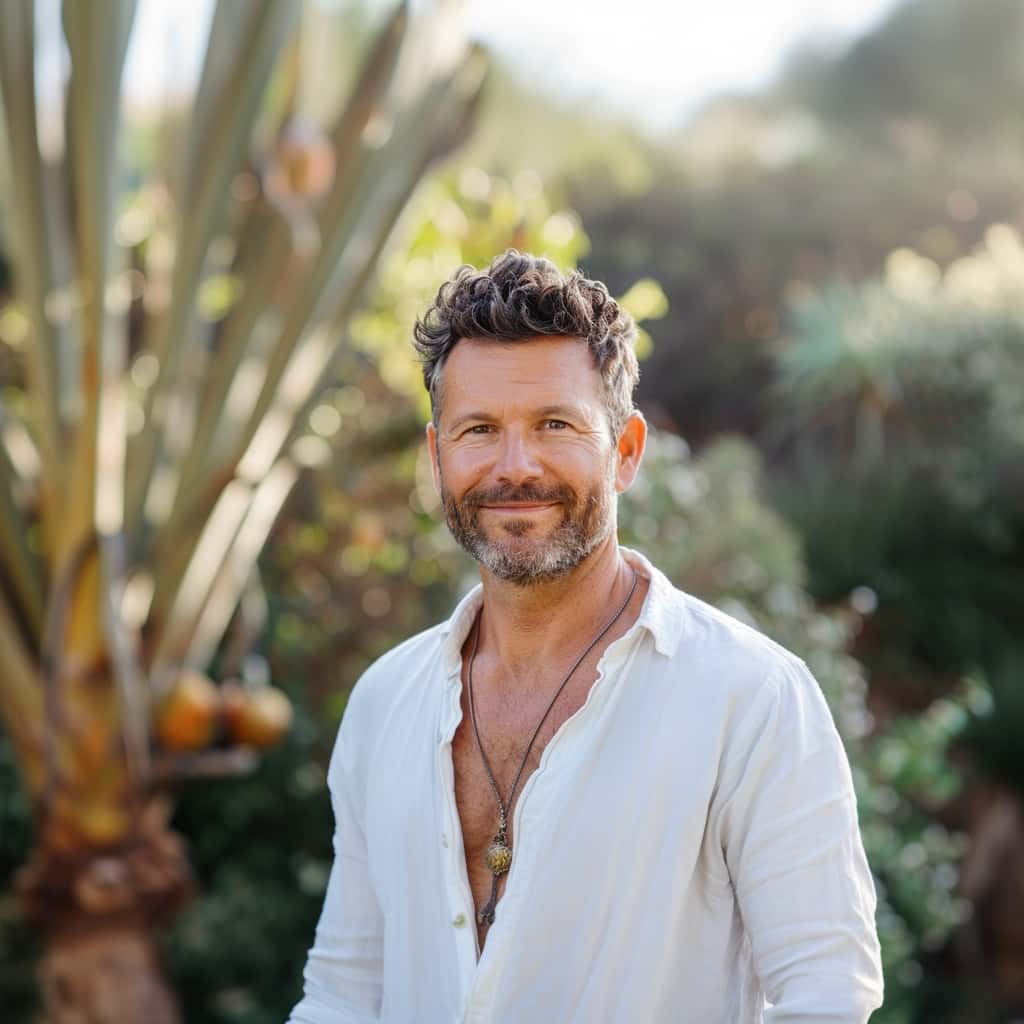Ancient wisdom offers valuable insights developed through centuries of observation and experimentation, forming a solid foundation for modern science. When you connect traditional practices like herbal medicine or meditation with scientific validation, you open new health solutions and sustainable approaches. Bridging these worlds involves respecting diverse knowledge, embracing interdisciplinary methods, and fostering dialogue. This integration can lead to more holistic well-being and innovation—if you explore further, you’ll discover how combining these perspectives enhances our understanding and future well-being.
Key Takeaways
- Traditional practices are rooted in empirical observation and are validated through scientific research, fostering integration of ancient and modern knowledge.
- Modern science explores and confirms the effectiveness of ancient techniques like acupuncture and herbal remedies, enhancing holistic health approaches.
- Combining traditional wisdom with scientific methods promotes innovation, sustainable development, and a deeper understanding of health and environment.
- Interdisciplinary frameworks and dialogue help bridge cultural and epistemological differences, enabling effective collaboration between ancient and scientific communities.
- Embracing both perspectives supports comprehensive well-being by integrating mind, body, environment, and cultural practices for resilient health solutions.
Exploring the Roots of Ancient Practices and Their Scientific Foundations
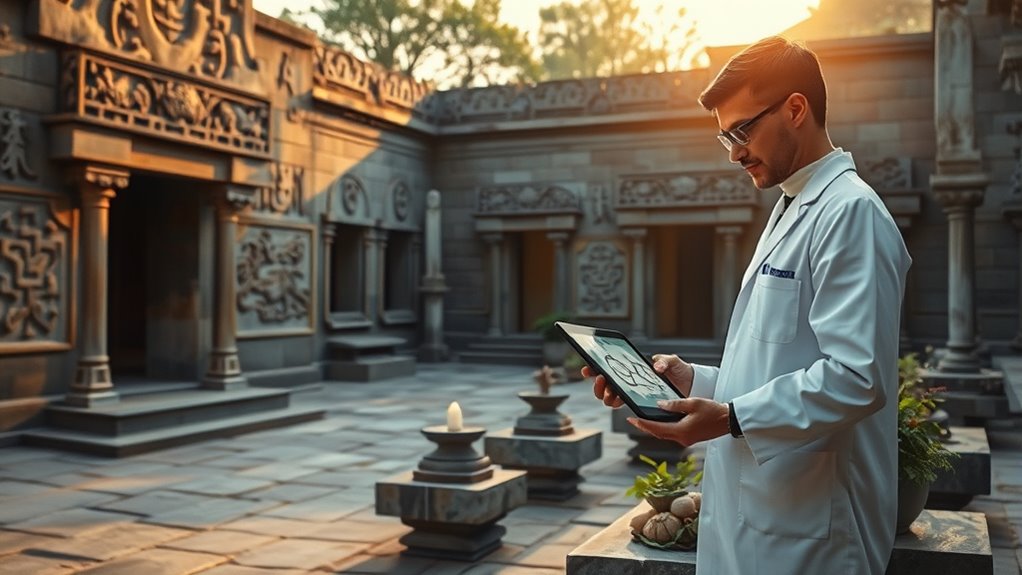
Many ancient practices have persisted because they are rooted in observations and methods that proved effective over time. You might notice that traditional herbal remedies, for example, often stem from careful experimentation and long-term use. Ancient healers observed which plants alleviated symptoms and passed their knowledge through generations. These practices weren’t random; they were based on empirical evidence gathered through trial and error. Similarly, methods like acupuncture or meditation were developed by observing how the body responds and seeking balance. While these practices may not always align with modern science, their origins reveal a deep understanding of human health and natural phenomena. Recognizing this helps you appreciate how ancient knowledge was built on systematic observation, forming a foundation that modern science continues to explore through scientific validation. Additionally, techniques like herbal medicine often involved listening to patient feedback, which contributed to their refinement over time. Many of these ancient methods also incorporated natural explanations based on the environment and available resources, further demonstrating their empirical roots. This historical context underscores the importance of integrating both ancient wisdom and scientific research in holistic health practices. Furthermore, ongoing research continues to uncover the scientific basis behind many traditional treatments, bridging the gap between the past and present.
Modern Scientific Discoveries Inspired by Traditional Knowledge Systems
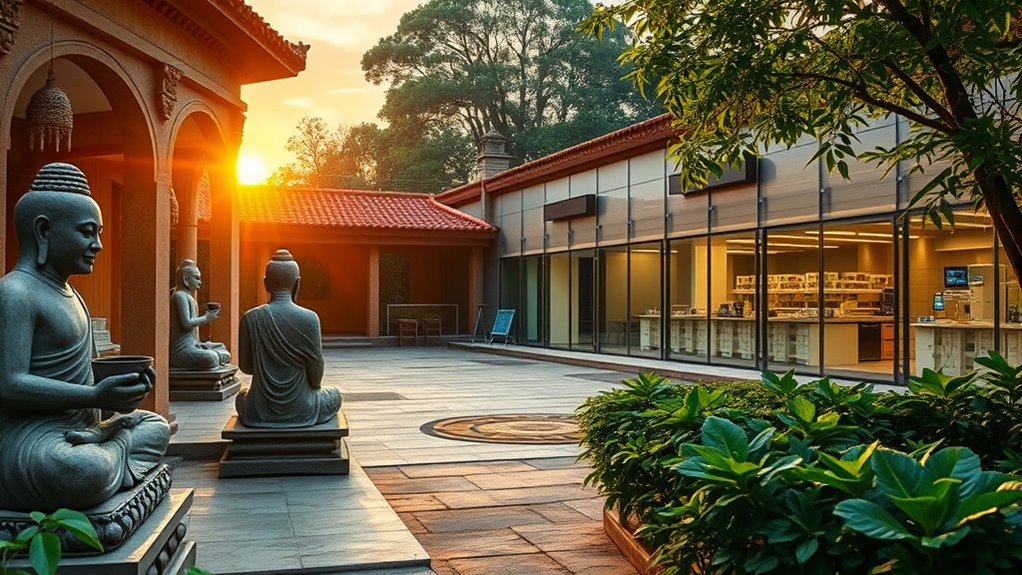
Traditional knowledge systems have often served as a valuable starting point for modern scientific discoveries. You might find that ancient practices, like herbal medicine or natural remedies, lead to breakthroughs in pharmaceuticals. For example, traditional Chinese medicine’s use of artemisinin revolutionized malaria treatment, saving countless lives. Similarly, indigenous knowledge about plant properties has guided scientists in discovering new compounds with potential health benefits. These discoveries aren’t mere coincidences; they stem from centuries of observation and experimentation. By studying traditional practices carefully, you can uncover insights that inspire cutting-edge research. This approach bridges old wisdom with new technology, accelerating innovation. It emphasizes the importance of respecting and understanding traditional knowledge, recognizing its potential to contribute to scientific progress in ways previously overlooked. Recognizing the value of observation and experimentation in traditional practices can lead to more meaningful scientific breakthroughs. Additionally, innovative indoor gardening solutions like unique planters and efficient watering systems exemplify how modern science enhances traditional horticultural practices. Furthermore, the integration of AI in Education can be used to develop personalized learning tools that incorporate traditional knowledge, fostering a deeper connection between ancient wisdom and contemporary science. Exploring natural materials used in Waldorf toys illustrates how sustainable practices can inspire new technological advancements with eco-friendly benefits. Moreover, fostering cultural intelligence in scientific research teams can improve cross-disciplinary collaboration and enhance the integration of diverse traditional knowledge systems into modern innovation.
Case Studies: Convergence of Ancient Wisdom and Contemporary Science
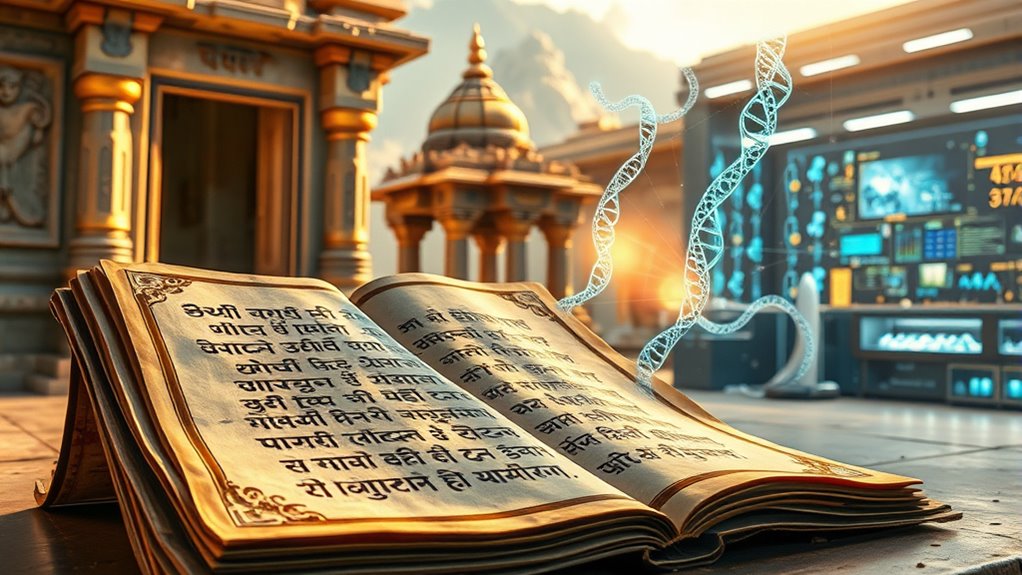
Real-world examples highlight how ancient wisdom and modern science can work together to produce remarkable breakthroughs. For instance, traditional Chinese medicine’s use of acupuncture has gained scientific backing through neuroimaging studies showing its effects on brain activity and pain relief. Similarly, Ayurveda’s herbal formulations are now being examined with advanced phytochemistry techniques, identifying active compounds that modern medicine can develop into new treatments. Indigenous knowledge about soil health has informed sustainable farming practices validated by scientific research. Additionally, the integration of scientific validation with traditional practices often leads to more effective and accepted health solutions. These case studies demonstrate that integrating ancient insights with contemporary methods accelerates innovation and deepens understanding. By respecting and examining traditional practices through scientific lenses, you can access valuable knowledge that benefits health, sustainability, and technology, fostering a collaborative approach that bridges two worlds of knowledge. Furthermore, exploring dream analysis and other psychological insights from ancient philosophies can enhance our understanding of mental health and emotional well-being in modern contexts. Incorporating traditional healing practices into modern healthcare models can also open new avenues for holistic treatment approaches. Recognizing the interdisciplinary nature of these fields encourages ongoing research and cross-cultural collaboration to optimize health and well-being. Exploring ancient scientific methods can also reveal foundational principles that modern science continues to build upon, fostering mutual respect and innovation.
Challenges and Opportunities in Integrating Diverse Ways of Knowing
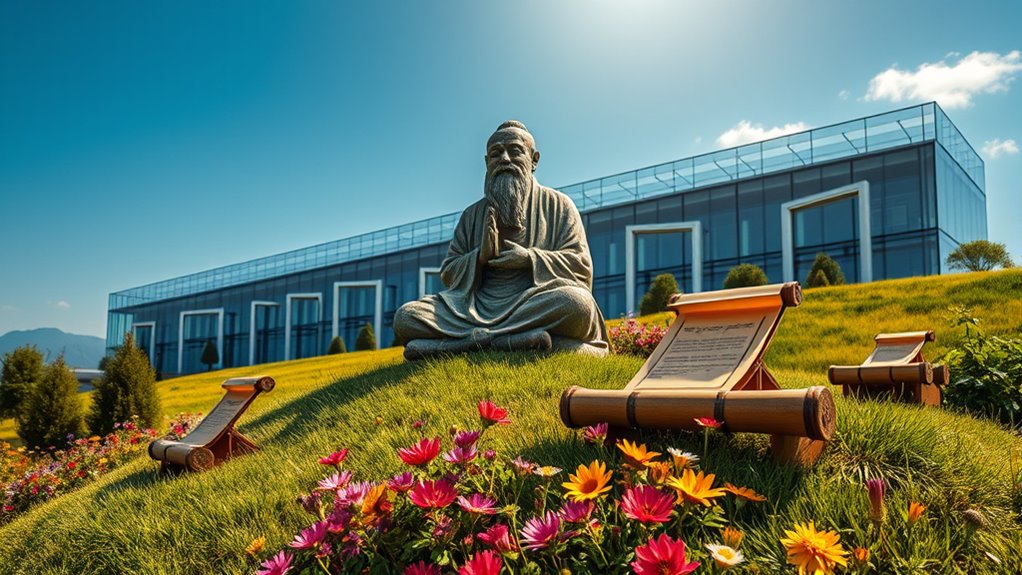
Integrating diverse ways of knowing presents both significant opportunities and notable challenges. You may find that blending ancient wisdom with modern science offers richer insights and innovative solutions, fostering a more holistic understanding of complex issues. However, you might also face skepticism from scientific communities that prioritize empirical evidence, or encounter cultural misunderstandings that hinder genuine collaboration. Differences in language, methodology, and epistemology can create barriers, making it difficult to establish mutual trust. Despite these hurdles, opportunities abound for creating interdisciplinary frameworks that respect and incorporate multiple perspectives. By remaining open-minded and committed to dialogue, you can help bridge gaps between traditions, encouraging a more inclusive approach to knowledge that benefits both personal growth and societal progress. Recognizing the importance of AI Bifurcation and its implications can further inform how we integrate traditional and scientific knowledge in the pursuit of innovation. Cultivating cross-disciplinary collaboration can help overcome stereotypes and foster mutual respect among diverse knowledge systems. Embracing scientific validation of ancient practices, when appropriate, can also facilitate greater acceptance and integration. For example, understanding the bike mechanisms involved in shifting gears or inflating tires can serve as a metaphor for the precise and methodical approach needed to harmonize ancient techniques with scientific inquiry. Additionally, understanding the juice cleanse and detox practices from both perspectives can lead to more effective health strategies that honor traditional methods while applying scientific rigor.
Toward a Holistic Approach: Merging Insights for Personal and Global Well-being
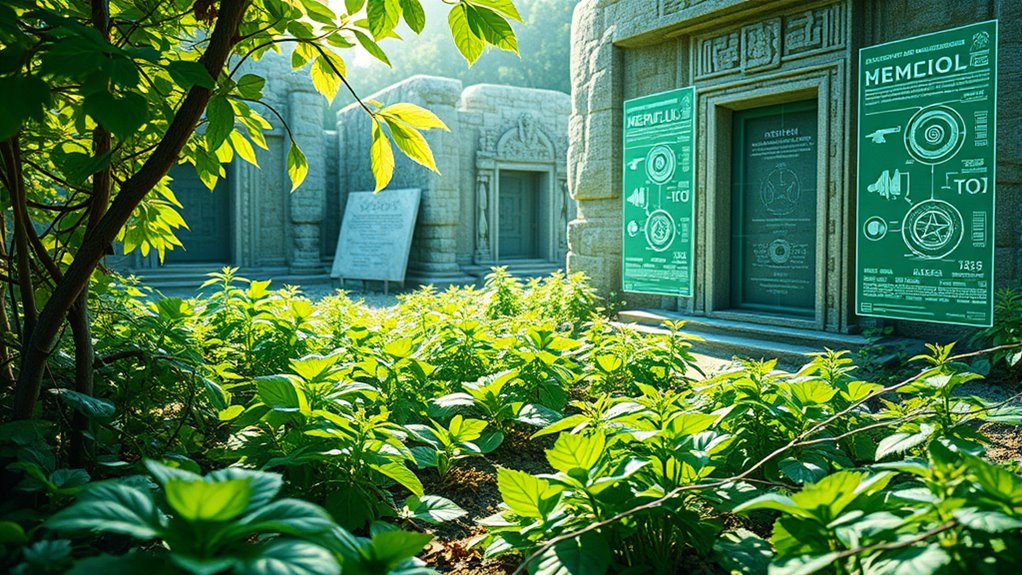
By merging diverse insights from ancient wisdom and modern science, you can develop a more all-encompassing approach to both personal fulfillment and global well-being. This integration helps you see the interconnectedness of mind, body, and environment. To deepen this approach, consider these steps:
Integrate ancient wisdom and science to nurture mind, body, environment, and community for holistic well-being.
- Embrace mindfulness practices rooted in traditions like meditation and yoga, supported by neuroscience research on stress reduction.
- Incorporate scientific insights into sustainable living, recognizing the importance of ecological balance for long-term health.
- Foster community connections that blend social cohesion with ancient rites, promoting collective resilience and shared purpose.
- Educate yourself about Gold IRA Rollovers, which can provide a secure foundation for your financial future and contribute to overall well-being.
Frequently Asked Questions
How Can Ancient Wisdom Influence Future Scientific Research Methods?
You can see that integrating ancient wisdom into future scientific research methods offers valuable insights. By respecting traditional knowledge, you’ll discover holistic approaches and sustainable practices that modern science might overlook. This blend encourages innovative problem-solving, fosters cultural understanding, and promotes more all-encompassing research. Embracing ancient wisdom helps you develop diverse methodologies, enriches scientific perspectives, and ultimately advances technology and health innovations rooted in centuries of experiential knowledge.
What Ethical Considerations Arise When Integrating Traditional Knowledge With Modern Science?
When integrating traditional knowledge with modern science, you need to consider ethics carefully. Respect for cultural origins is vital, ensuring communities benefit from their knowledge. Avoid exploitation, and obtain proper permissions before using traditional practices. Also, balance scientific validation with honoring cultural significance. By doing so, you foster trust, promote fairness, and create respectful collaborations that honor both scientific inquiry and cultural heritage.
Are There Cultural Sensitivities Involved in Blending These Two Knowledge Systems?
When you blend traditional knowledge with modern science, you need to be aware of cultural sensitivities. You might unintentionally disrespect or misrepresent a community’s beliefs if you don’t approach their knowledge respectfully. It’s essential to engage with communities directly, listen carefully, and make certain they’re comfortable with how their knowledge is used. Respect and open dialogue help you honor cultural values while fostering meaningful collaborations.
How Do Different Cultural Perspectives Shape the Interpretation of Scientific Data?
You see that cultural perspectives influence how scientific data is interpreted because beliefs, values, and traditions shape your understanding of evidence. Different cultures may emphasize certain aspects or question findings based on their worldview. This means you might interpret the same data differently depending on your background. Recognizing these perspectives helps you appreciate diverse viewpoints and promotes more inclusive, respectful discussions in science and beyond.
Can Ancient Practices Be Scientifically Validated Without Losing Their Cultural Significance?
Imagine trying to upload an ancient app onto a modern device—you want it to work without losing its original charm. You can validate ancient practices scientifically by respecting their cultural roots while applying rigorous research. You don’t have to erase their significance; instead, you integrate modern methods carefully, honoring traditions. This way, you preserve cultural meaning, enrich scientific understanding, and keep the wisdom alive in today’s world.
Conclusion
Imagine holding an ancient key that unlocks modern secrets—by blending wisdom from the past with scientific discovery, you open new doors to understanding yourself and the world. Just like a river flows seamlessly from mountain to sea, integrating ancient practices with science creates a powerful current toward holistic well-being. Embracing both worlds, you can navigate life’s complexities with greater clarity, forging a future where tradition and innovation work hand in hand for a healthier, wiser tomorrow.


